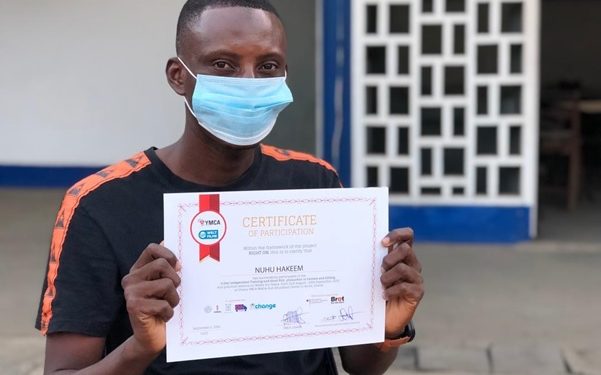By MOHAMED SALIM ROTEA
During the long months of Ghana’s 2020 COVID-19 lockdown, Nuhu Hakeem found himself confined to his home in Tamale, a recent graduate from the University for Development Studies holding a degree in Social Change Communication. Endless scrolling on Facebook became his escape, as he brainstormed ideas for films that could capture the hardships faced by children whose schooling had been upended by the pandemic. He had already tried his hand at filmmaking, co-creating a short series titled Chapters in 2017, where he took on a lead role, but lack of resources and guidance left those efforts stalled. One day, a simple post about a free virtual film class offered by the Ghana YMCA appeared in his feed. He enrolled without high hopes, yet that decision opened doors he never imagined. Today, as Communications Director for the Mother of all Nations Foundation, Nuhu credits the organization for reshaping his future. “Ghana YMCA has given me a family I can rely on forever,” he reflects, his words carrying the weight of genuine transformation.
This personal turnaround reflects the deeper mission of the Ghana Young Men’s Christian Association, an institution with roots stretching back over a century in the country. Founded in 1890 by Wilkins Micaber Abbey, a young scholar from the Gold Coast who discovered the movement during a study tour in Scotland, the Ghana YMCA emerged as one of Africa’s earliest branches. Abbey drew inspiration from the global YMCA’s origins in 1844, when Sir George Williams established it in London to provide young men with safe havens amid the Industrial Revolution’s urban challenges, emphasizing Christian values alongside personal development. In Ghana, it began as a modest effort in Accra to foster similar growth, evolving into a non-denominational, not-for-profit entity dedicated to empowering youth for the African renaissance. Operating across all administrative regions, it maintains five key regional offices in Greater Accra, Volta, Eastern, Ashanti/Brong Ahafo, and Western, with facilities like vocational centers in Accra, Apedwa, and Takoradi, plus day care services in seven regions. This widespread presence ensures accessibility, setting it apart from other NGOs by blending historical longevity with practical, community-focused outreach.
At its core, the Ghana YMCA’s structure supports this expansive reach through a layered governance model designed for efficiency and inclusivity. The National Council serves as the highest decision-making body, led by the National President and comprising representatives from all areas to set strategic directions. Beneath it, the National Board executes these visions, while Regional Councils and Boards handle local oversight, each presided over by a Regional President. Regional Directorates, managed by Regional Directors who report to the Executive Director, implement daily programs. Local branches feature advisory boards of five to nine members, including youth representatives, elected for two-year terms with roles like chairperson, secretary, and chaplain. Currently, Kwabena Nketia Addae holds the position of Executive Director, guiding the organization with emphasis on youth skills and community partnerships, as evidenced by his active involvement in recent initiatives like workshops in 2025. Under his leadership, the YMCA completed an Organizational Health Assessment in July 2025, strengthening its alignment with global standards.
Membership forms the backbone of this structure, making participation straightforward and welcoming to diverse groups. Individuals join through local clubs or branches, with five categories tailored to different commitments: full membership for those embracing Christian principles and eligible for leadership roles; associate for program participants without faith requirements; junior for those under 18 or students; life for ongoing supporters via donations or expertise; and honorary for distinguished community figures invited to advance the cause. Renewal occurs annually with modest fees, and anyone aligning with the YMCA’s values can enroll, regardless of background, fostering a sense of investment in personal and communal growth.
For Nuhu, this inclusive approach manifested through the Right On Film Training workshop, a collaboration with Germany’s WELTFILME that blended virtual sessions during the lockdown with in-person training in Accra. The program equipped him with essential skills in scriptwriting, directing, editing, and collaborative communication, transforming his solo efforts into team-driven successes. “I learned to value teamwork; more heads make projects stronger,” he shares. Mentors such as Mr. Goddy and Mr. Nkrumah provided patient guidance, building lasting networks that helped Nuhu produce a documentary on education disruptions, part of 12 short films that bolstered Ghana’s emerging film industry amid crisis. This hands-on experience mirrors broader YMCA projects, like Hi-Y clubs in high schools and Y Clubs in universities, which offer leadership training, debates, and community service to instill moral and practical skills.
Building on such initiatives, the Ghana YMCA addresses pressing societal needs through diverse programs that extend its impact far beyond individual stories. The SMARTGIRL project, for instance, has educated over 900 young women on menstrual health and confidence, reducing stigma and school dropouts in communities. Similarly, the 2023 Green Idea initiative, supported by Swedish funding, trained 20 youth ambassadors in Takoradi for plastic recycling and urban farming, contributing to UN Sustainable Development Goals and local environmental resilience. Vocational efforts, pioneered with the 1966 Accra Technical Training Center and later expansions, teach trades like carpentry and digital skills, tackling youth unemployment rates around 12 percent. These activities, including youth justice advocacy and prayer meetings, have nurtured generations, with alumni like Prosper Hoeyi, a former National General Secretary, praising its role in moral upbringing. Broadcasting workshop graduates often secure jobs or launch ventures, while volunteers emphasize the unique sense of belonging that sustains long-term community ties.
Ultimately, the Ghana YMCA’s 135-year legacy has profoundly shaped Ghanaian communities by promoting self-reliance and equity in a nation facing inequality and climate pressures. With global connections to 45 million members and local roots in eight regions, it stands as a steady force for change. For Nuhu, that lockdown discovery led to multilingual gratitude “Meda moase! Akpena! Oyiwalador! Vielin Danke!” symbolizing the cross-cultural bonds formed. In essence, the organization proves that targeted support can ignite widespread progress, one life at a time.










